13 Jun Tips for Healthy Grilling!
Summer is here and that means so is BBQ season! There’s something about cooking food outdoors that makes it taste better, am I right? Plus, as we are easing out of lockdown with increased vaccination and covid-19 infection rates coming down, having friends and family over for BBQ is a great way to stay safe and enjoy some much-needed time with loved ones.
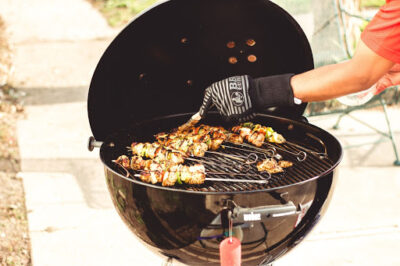 Grilling is generally considered a healthful cooking method. But at the same time, you may have heard that grilled foods increase the risk for cancer. I’m hoping to clear this up for you and give you a few tips to grill safely. Charring foods on the grill creates carcinogens called heterocyclic amines (HCAs). They’re formed when amino acids (the building blocks of protein) and creatine (a natural compound in muscle meats) react at high temperatures. Also, cancer-causing chemicals, called polycyclic aromatic hydrocarbons (PAHs), can form when fat and juices from meat drip onto hot coals or stones. PAHs are then deposited on the surface of meat by smoke and flare-ups. HCAs and PHAs can damage DNA after they’re activated by certain enzymes in the body. The activity of these enzymes varies among people, influencing cancer risk associated with cooked meat. Animal studies have shown that exposure to HCAs and PAHs causes cancers. Research in people, though, hasn’t proved this cause and effect link.
Grilling is generally considered a healthful cooking method. But at the same time, you may have heard that grilled foods increase the risk for cancer. I’m hoping to clear this up for you and give you a few tips to grill safely. Charring foods on the grill creates carcinogens called heterocyclic amines (HCAs). They’re formed when amino acids (the building blocks of protein) and creatine (a natural compound in muscle meats) react at high temperatures. Also, cancer-causing chemicals, called polycyclic aromatic hydrocarbons (PAHs), can form when fat and juices from meat drip onto hot coals or stones. PAHs are then deposited on the surface of meat by smoke and flare-ups. HCAs and PHAs can damage DNA after they’re activated by certain enzymes in the body. The activity of these enzymes varies among people, influencing cancer risk associated with cooked meat. Animal studies have shown that exposure to HCAs and PAHs causes cancers. Research in people, though, hasn’t proved this cause and effect link.
The good news here is that there are a number of ways to drastically reduce the formation of HCAs and PHAs when you cook protein. Here are 5 tips to keep in mind before you fire up the grill.
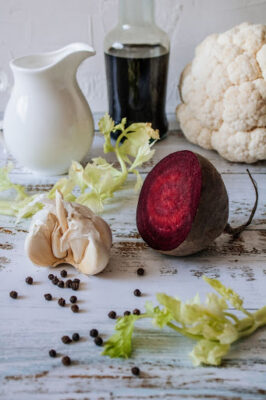 1. Marinate. Marinating meat for at least 30 minutes has been shown to reduce carcinogen formation during grilling by as much as 99%. Marinating meat before grilling helps tenderize, add flavour and acts as a barrier. Studies have also shown that marinades with little or no sugar also help protect the meat from charring and have been shown to reduce dangerous compounds that have been linked to cancer. Ingredients in a marinade such as lemon or lime, olive oil and fresh herbs contain antioxidants that may block the formation of HCAs and PAHs. A longer marinating time means more antioxidants will be incorporated into the meat. Dry rubs made with olive oil, herbs and spices may also help to reduce carcinogen formation.
1. Marinate. Marinating meat for at least 30 minutes has been shown to reduce carcinogen formation during grilling by as much as 99%. Marinating meat before grilling helps tenderize, add flavour and acts as a barrier. Studies have also shown that marinades with little or no sugar also help protect the meat from charring and have been shown to reduce dangerous compounds that have been linked to cancer. Ingredients in a marinade such as lemon or lime, olive oil and fresh herbs contain antioxidants that may block the formation of HCAs and PAHs. A longer marinating time means more antioxidants will be incorporated into the meat. Dry rubs made with olive oil, herbs and spices may also help to reduce carcinogen formation.
2. Reduce grill time. Cooking meat for a long time generates more carcinogens. Keep your meat portions small so they’re on the grill for less time. In place of grilling an 8-ounce steak choose 4 or 6 ounces. If you are cooking a larger cut of meat you can partially pre-cook it in the oven and finish it off on the grill. Research shows that this can significantly reduce the formation of HCAs and PAHs. You can also take advantage of using skewers as a way to cut back on grilling time. Click here for a delicious recipe for grilled vegetables and chicken skewers.
3. Go lean. Processed meats such as hotdogs, sausages, and bacon—no matter how they’re cooked—are associated with an increased risk of cancer and heart disease, so adding harmful HCAs and PAHs by grilling those cured, preserved, or smoked meats increase the potential for damage. Choose lean cuts (e.g., sirloin, tenderloin, flank steak, lean ground meat) and trim excess fat before cooking. When fat from cooking meat drips down onto the hot coals, the smoke contains PAHs, it would be a good idea to keep a squirt bottle of water nearby to control flare-ups. If you do char your meat, cut those bits off before eating.
4. Flip often. Flip the meat about once every minute. Rapid turning will help prevent HCAs from forming. When you are done grilling make sure to take a few minutes to clean your grill thoroughly after each use to get rid of any charred food that is stuck to the surface. Bristle brushes are the most effective tools for cleaning a grill, and the bristles can be made of stainless steel, brass, nylon, or natural materials. I love this one.
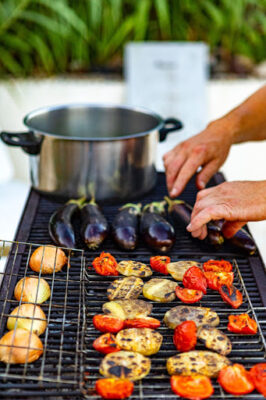 5. Grill veggies and fruit. We can all increase our fruit and veggie intake, and grilling them is a delicious way to enjoy them. The best part is that PAHs and HCAs don’t form on grilled fruits and vegetables. Fruits and vegetables help the liver remove potential toxins from the body. In particular, cruciferous veggies (broccoli, cauliflower, cabbage, kale, Brussel sprouts, etc.) seem to be extra helpful. Plus, if you are having grilled meat, it’s a great idea to get antioxidant-rich fruits and vegetables in the same meal. Grill bell peppers, onions, portabello mushrooms, eggplant, fennel, zucchini, sweet potato, pineapple, and peaches. Tofu and bean burgers are healthy grilling choices, too! Try this delicious grilled pineapple with yogurt dipping sauce
5. Grill veggies and fruit. We can all increase our fruit and veggie intake, and grilling them is a delicious way to enjoy them. The best part is that PAHs and HCAs don’t form on grilled fruits and vegetables. Fruits and vegetables help the liver remove potential toxins from the body. In particular, cruciferous veggies (broccoli, cauliflower, cabbage, kale, Brussel sprouts, etc.) seem to be extra helpful. Plus, if you are having grilled meat, it’s a great idea to get antioxidant-rich fruits and vegetables in the same meal. Grill bell peppers, onions, portabello mushrooms, eggplant, fennel, zucchini, sweet potato, pineapple, and peaches. Tofu and bean burgers are healthy grilling choices, too! Try this delicious grilled pineapple with yogurt dipping sauce
Taking a look at the bigger picture of your health is key. Being sedentary, having excess body fat, and eating a diet rich in highly processed foods are much greater risk factors for cancer. HCAs and PAHs make a minor contribution to your cancer risk.
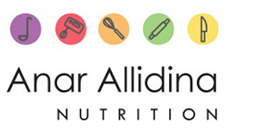


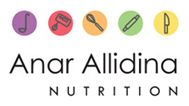
Sorry, the comment form is closed at this time.